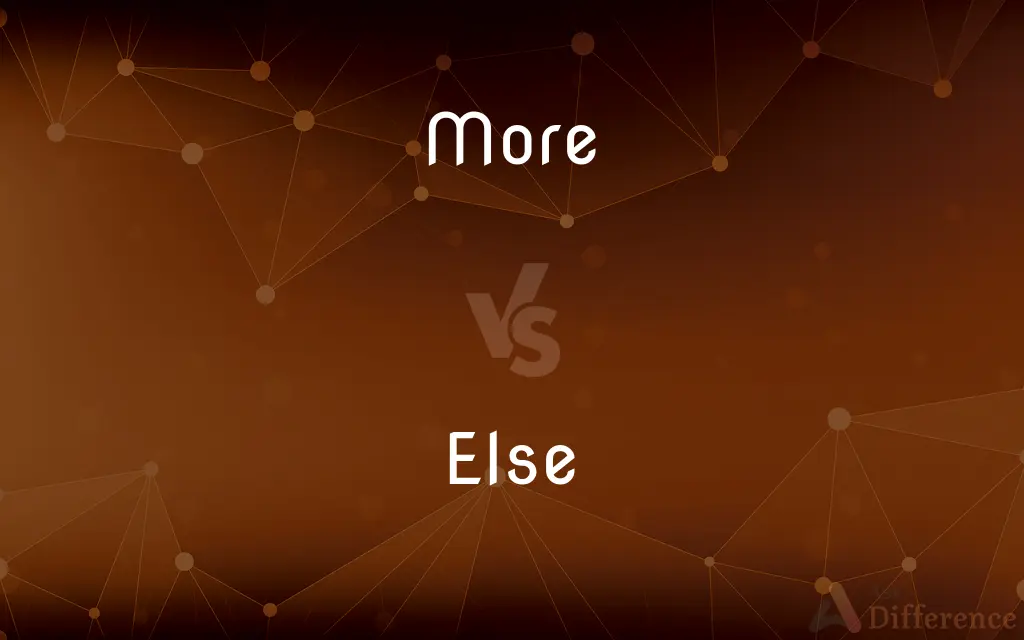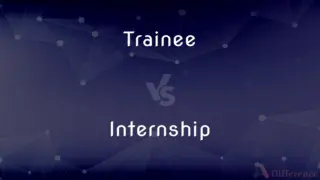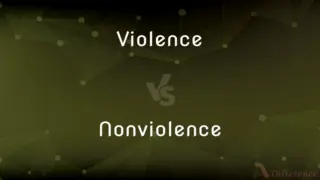More vs. Else — What's the Difference?
By Maham Liaqat & Urooj Arif — Updated on April 5, 2024
More indicates an additional quantity or extent, often compared to a previously mentioned amount, while else suggests an alternative or addition different from what has already been considered.

Difference Between More and Else
Table of Contents
ADVERTISEMENT
Key Differences
More is used to signify an increase in quantity, quality, or degree, expressing the concept of additional amounts or extents in various contexts. For instance, when someone says they want more food, they're asking for an increased quantity of what they've already been having. Else, on the other hand, introduces an alternative or suggests something different from what is present or has been mentioned. It's often used in conjunction with "anything," "anyone," "somewhere," etc., to imply other possibilities or options, as in deciding to go somewhere else for dinner.
When discussing preferences or choices, "more" can be used to express a desire for a greater amount of the same item or experience. For example, reading more books to gain knowledge implies increasing the quantity within the same activity or category. Else is employed to indicate a shift towards something different, not more of the same. For example, if one doesn't like the book they're reading, they might look for something else, signifying a change in choice rather than an increase in quantity.
In the realm of decision-making, "more" can emphasize the extension of existing conditions or quantities, such as wanting more time to complete a task, which suggests extending the current timeframe. Else can suggest alternatives when the current conditions or options are unsatisfactory, offering a way out or a different approach, like when one seeks a different solution to a problem, implying dissatisfaction with the current options.
More is often used in comparative structures to highlight differences in scale or intensity, such as when comparing one's current achievements to their past, indicating progress or a desire to exceed previous efforts. Else, contrasts by implying a range of alternatives or the existence of other options beyond the current scope, catering to preferences for diversity or change, as in exploring other career paths.
Comparison Chart
Primary Function
Indicates an increase or addition in quantity
Suggests alternatives or additional different options
ADVERTISEMENT
Contextual Usage
Comparative, asking for more of the same
Alternative, looking for other options
Examples
More time, more information
Anything else, somewhere else
Connotation
Extension or increase of existing conditions
Introduction of different choices or paths
Grammatical Role
Adjective, adverb
Adverb, conjunction
Compare with Definitions
More
An additional quantity or extent.
He asked for more, unable to get enough.
Else
Suggesting a different option or preference.
If not here, where else would you like to go?
More
Refers to a greater amount or degree.
She wants to eat more cake.
Else
Used to indicate an alternative.
What else can we do tonight?
More
Used to form the comparative of many adjectives and adverbs.
She is more intelligent than her brother.
Else
Refers to additional or further actions or items.
Who else was invited to the party?
More
Used to indicate additional occurrences.
If you need more help, just ask.
Else
Used after question words to ask about other possibilities.
Where else could they be?
More
Expressing a desire for an increase in a specific activity or thing.
Reading more books can enhance your knowledge.
Else
In addition to what has been mentioned.
The test requires precision and speed, else you fail.
More
Greater in number
A hall with more seats.
Else
Other; different
Ask somebody else.
More
Greater in size, amount, extent, or degree
More land.
More support.
Else
Additional; more
Would you like anything else?.
More
Additional; extra
She needs some more time.
Else
In a different or additional time, place, or manner
I always do it this way and I don't know how else it could be done. Where else do you want to go besides Miami?.
More
A greater or additional quantity, number, degree, or amount
The more I see of you the more I like you.
Else
Other; in addition to previously mentioned items.
The instructor is busy. Can anyone else help me?
More
To or in a greater extent or degree
Loved him even more.
Else
(usually follows interrogative adverbs) Otherwise, if not.
How else (= in what other way) can it be done?
I'm busy Friday; when else (= what other time) works for you?
More
Used to form the comparative of many adjectives and adverbs
More difficult.
More softly. See Usage Note at perfect.
Else
For otherwise; or else.
Then the Wronskian of f and g must be nonzero, else they could not be linearly independent.
More
In addition
Phoned twice more.
Else
Other; one or something beside; as, Who else is coming? What else shall I give? Do you expect anything else?
More
Moreover; furthermore.
Else
Besides; except that mentioned; in addition; as, nowhere else; no one else.
More
Comparative of many
There are more ways to do this than I can count.
Else
Otherwise; in the other, or the contrary, case; if the facts were different.
For thou desirest not sacrifice; else would I give it.
More
Senseid|en|comparative form of much}} {{comparative of much
There's more caffeine in my coffee than in the coffee you get in most places.
Else
Other than what is under consideration or implied;
Ask somebody else
I don't know what else to do
Where else can we look?
More
Additional; further.
If you run out, there are more bandages in the first aid cupboard.
More people are arriving.
I want more soup.
I need more time.
Else
More;
Would you like anything else?
I have nothing else to say
More
Bigger, stronger, or more valuable.
He is more than the ten years he spent behind bars at our local prison, as he is a changed man and his past does not define him.
Else
Additional to or different from this one or place or time or manner;
Nobody else is here
She ignored everything else
I don't know where else to look
When else can we have the party?
Couldn't decide how else it could be done
More
To a greater degree or extent.
I like cake, but I like chocolate more.
I could no more climb that than fly!
More advanced students.
I have more than carried out my obligation.
I have no complaints and no more does my mom.
Else
(usually used with `or') if not, then;
Watch your step or else you may fall
Leave or else I'll get angry
More
Used to form the comparative form of adjectives and adverbs.
You're more beautiful than I ever imagined.
More
In negative constructions: any further, any longer; any more.
More
Used in addition to an inflected comparative form.
I was more better at English than you.
More
A greater number or quantity (of something).
We're running out of napkins. I should have bought more.
There isn't enough salt in this. You need to add more.
More
An extra or additional quantity (of something).
There aren't many people here yet, but more should be arriving soon.
More
Comparative of many
Last year’s applications received from new and returning students were more than each of the previous four years.
More
Comparative of much
More
(obsolete) A carrot; a parsnip.
More
(dialectal) A root; stock.
More
(dialectal) A plant; flower; shrub.
More
(transitive) To root up.
More
A hill.
More
A root.
More
A greater quantity, amount, or number; that which exceeds or surpasses in any way what it is compared with.
And the children of Israel did so, and gathered, some more, some less.
More
That which is in addition; something other and further; an additional or greater amount.
They that would have more and more can never have enough.
O! That pang where more than madness lies.
More
Greater; superior; increased;
He gat more money.
If we procure not to ourselves more woe.
Whilst sisters nine, which dwell on Parnasse height,Do make them music for their more delight.
The more part knew not wherefore they were come together.
Wrong not that wrong with a more contempt.
More
Greater in number; exceeding in numbers; - with the plural.
The people of the children of Israel are more and mightier than we.
More
Additional; other; as, he wept because there were no more worlds to conquer.
With open arms received one poet more.
More
In a greater quantity; in or to a greater extent or degree.
Admiring moreThe riches of Heaven's pavement.
More
With an adjective or adverb (instead of the suffix -er) to form the comparative degree; as, more durable; more active; more sweetly.
Happy here, and more happy hereafter.
The duke of MilanAnd his more braver daughter.
More
In addition; further; besides; again.
Yet once more, O ye laurels, and once more,Ye myrtles brown, with ivy never sere,I come to pluck your berries harsh and crude.
Those oracles which set the world in flames,Nor ceased to burn till kingdoms were no more.
More
To make more; to increase.
More
English statesman who opposed Henry VIII's divorce from Catherine of Aragon and was imprisoned and beheaded; recalled for his concept of Utopia, the ideal state
More
(comparative of `much' used with mass nouns) a quantifier meaning greater in size or amount or extent or degree;
More land
More support
More rain fell
More than a gallon
More
(comparative of `many' used with count nouns) quantifier meaning greater in number;
A hall with more seats
We have no more bananas
More than one
More
Existing or coming by way of addition;
An additional problem
Further information
There will be further delays
Took more time
More
Used to form the comparative of some adjectives and adverbs;
More interesting
More beautiful
More quickly
More
Comparative of much; to a greater degree or extent;
He works more now
They eat more than they should
Common Curiosities
Can "more" and "else" be used together in a sentence?
Yes, they can be used together when indicating a desire for additional alternatives, e.g., "Do you need anything more or anything else?"
What does "more" imply in a sentence?
More implies an additional amount or degree of something already discussed or understood.
What distinguishes "more" from "else" in choices?
More suggests increasing the same choice, while else suggests switching to a different choice or adding new options.
What makes "else" a versatile word in English?
Its ability to introduce alternatives, imply additional information, or suggest other possibilities makes it versatile.
How does "else" contribute to the meaning of questions?
Else can turn a question into one seeking alternative options or additional information, broadening the scope of responses.
How does "more" enhance a narrative?
More can add depth to a narrative by emphasizing the increase or expansion of events, feelings, or quantities.
Can "else" imply urgency or necessity?
Yes, especially in contexts where it's used to indicate a need for immediate alternatives or when options are limited.
What role does "more" play in expressing satisfaction or dissatisfaction?
More often expresses a desire for continuation or increase, which can imply satisfaction with the current state and a wish for its extension.
How is "else" commonly used?
Else is commonly used to suggest an alternative or indicate additional possibilities beyond what has been mentioned.
Is "more" only related to quantity?
Not exclusively; more can also relate to quality, degree, or intensity in various contexts.
Is "more" primarily comparative?
Yes, it is often used in comparative structures to indicate a greater degree or quantity compared to another.
How does "else" affect the alternatives presented in a scenario?
Else expands the range of alternatives, often introducing entirely different options or paths.
How does "else" facilitate decision-making?
Else facilitates decision-making by offering alternative paths or solutions, encouraging exploration beyond the current scope.
In what context would "else" indicate exclusivity?
Else can indicate exclusivity when used to specify that no other options are considered acceptable or desired.
Can "more" signify progress?
Yes, more can indicate progress when used to compare past and present conditions or achievements.
Share Your Discovery

Previous Comparison
Trainee vs. Internship
Next Comparison
Violence vs. NonviolenceAuthor Spotlight
Written by
Maham LiaqatCo-written by
Urooj ArifUrooj is a skilled content writer at Ask Difference, known for her exceptional ability to simplify complex topics into engaging and informative content. With a passion for research and a flair for clear, concise writing, she consistently delivers articles that resonate with our diverse audience.














































